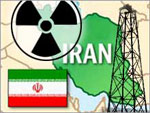 Wall Street Journal: Despite partisan divides, Americans consistently unite to defend against threats to national security. Chief among those threats is Iran, which has ignored repeated international calls for peace and instead pursued its nuclear-weapons capability and sponsored terrorist plots against the United States and its allies. The Wall Street Journal
Wall Street Journal: Despite partisan divides, Americans consistently unite to defend against threats to national security. Chief among those threats is Iran, which has ignored repeated international calls for peace and instead pursued its nuclear-weapons capability and sponsored terrorist plots against the United States and its allies. The Wall Street Journal
More attorneys general need to act on sanctions. After all, states control trillions in pension funds and spending.
By DOUGLAS F. GANSLER
 Despite partisan divides, Americans consistently unite to defend against threats to national security. Chief among those threats is Iran, which has ignored repeated international calls for peace and instead pursued its nuclear-weapons capability and sponsored terrorist plots against the United States and its allies.
Despite partisan divides, Americans consistently unite to defend against threats to national security. Chief among those threats is Iran, which has ignored repeated international calls for peace and instead pursued its nuclear-weapons capability and sponsored terrorist plots against the United States and its allies.
At the federal level, the threat of a nuclear-armed state sponsor of terror has brought nearly every member of Congress together to take action. In 2010, by a vote of 408-8 in the House and 99-0 in the Senate, Congress passed the Comprehensive Iran Sanctions, Accountability, and Divestment Act, which allows the U.S. to apply greater economic pressure on the Iranian regime. Cisada, as it is called, has been a powerful federal tool, but still more must be done.
The country’s 50 state governments have enormous combined economic power. State and local pension funds control more than $3 trillion in investments, and according to a 2012 report of the National Association of State Budget Officers, state governments oversee more than $1.5 trillion in expenditures each year.
That’s more than the gross domestic product of many industrialized countries. Yet when it comes to national-security threats, this power often goes unused.
For instance, the Comprehensive Iran Sanctions, Accountability, and Divestment Act expressly authorizes state action on sanctions against Iran, but so far only 24 states (my own, Maryland, among them) have put laws or policies in place that divest state pension funds from foreign companies with substantial investments in Iran’s energy sector. Maryland is one of only six states to have steered state expenditures away from Iran by prohibiting public contracts with foreign companies that maintain substantial investments in Iran’s energy sector.
The 26 states that are not participating in divestment sanctions are putting millions of hard-earned state employee pension dollars at risk by allowing them to be invested in companies that support an unstable, militant Iranian government. Those not implementing contracting sanctions are potentially allowing lucrative, taxpayer-funded state contracts to be awarded to companies engaged in business with a regime known for harboring terrorists and carrying out egregious violations of international law and human rights.
As the lawyers for state pension funds and the defenders of state consumer pocketbooks, states’ attorneys general should be doing all we can to protect state citizens from unnecessary financial risk. As the states’ chief law-enforcement officers, we should be fighting lawlessness whenever it ensnares our states.
Coordinated state-level sanctions against Iran will disentangle state economies from Iran’s harmful regime and increase pressure on companies to stop operating in Iran until its government changes its ways. According to the United Against Nuclear Iran advocacy group, California’s adoption of the Iran Contracting Act in 2010 persuaded several major foreign companies to stop doing business with Iran. Imagine how many more companies would follow suit if they were faced with the choice between the Iranian economy and the combined economy of 50 states.
State-level sanctions will also demonstrate to Israel and other American allies that U.S. states are as committed as the federal government to bending Iran toward peace and to ensuring a secure Middle East. This strong state action, when combined with U.S. and allied national sanctions on Iran, could play a vital role in finally forcing the Iranian regime to halt its nuclear aspirations. That moment could not come too soon.
Mr. Gansler is the attorney general of Maryland.


